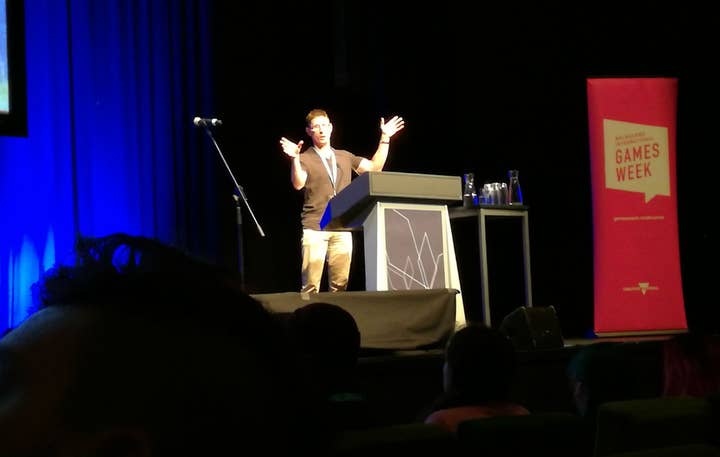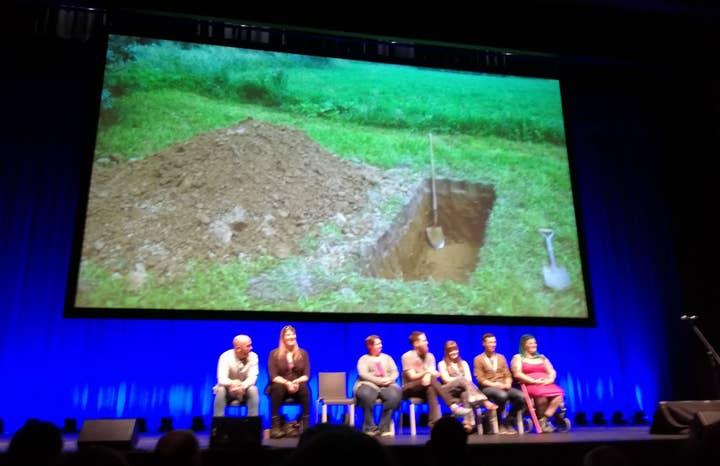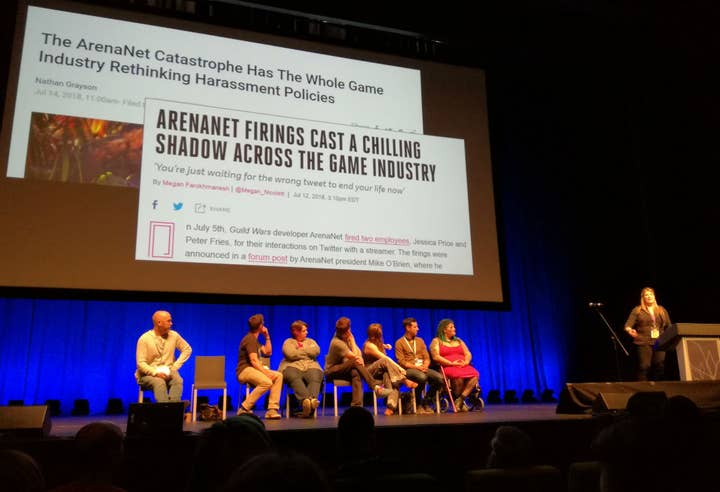“I've seen sleep disorders, chronic stress fatigue, dissolved relationships, broken marriages..."
At Game Connect Asia Pacific, Keith Fuller detailed the fallout from crunch, and Kate Edwards said "we need to find our rage" in order to fight it
The issue of crunch has been an ever present topic of conversation throughout 2018, and no more so than in the last few weeks. The trend was reflected in a session of "lightning talks" at Game Connect Asia Pacific today, with three of the participants using the opportunity to address the industry's reliance on strenuous working conditions.
Indeed, crunch was the very first point in the very first of these five-minute talks, a constraint specifically designed to force those speaking to make their point quickly and forcefully. Hipster Whale's Anna Tito used her time to address a list of key issues, of which crunch was at the top.
"As an industry we need to grow up," she said, highlighting "consistently long hours and crunch" as an obvious place to start. "It's not healthy, it's not conducive to quality work, and I don't even know why we're still having this discussion. Just stop it."
"I was tired of seeing impossible milestones paid for with the currency of developers' lives"
Keith Fuller
Another speaker, Keith Fuller, devoted every one of his five minutes to the problem, and for a very good reason. In 2010, after 11 years spent in AAA development, Fuller started working as an independent consultant advising game companies on "leadership and culture and people operations." If his time as a developer had taught him anything, it was that the industry was falling drastically short in every one of those areas.
"I was tired of seeing impossible milestones paid for with the currency of developers' lives," he said. "Milestones whimsically decreed by publishers, and cavalierly determined by studio leaders, or carved in stone to meet a marketing schedule.
"I've seen sleep disorders, chronic stress fatigue, dissolved relationships, broken marriages, and children separated from their parents because mum or dad is always at work... I wanted to see all of this fixed."

Over the past eight years, Fuller has talked to "dozens and dozens" of companies in his capacity as a consultant, from all over the world, in every sector of the industry. That process, he said, has given him a unique level of insight into the problems that have so frequently been in the headlines this year. The lightning talk format may encourage ranting, but Fuller's opinion felt neither manufactured nor insincere.
As Fuller himself stated: "There are things I can tell you about leadership with possibly the greatest authority of anyone you know."
Fuller was careful to acknowledge that there are companies that get this right; they place a high degree of value on people, and their health and well-being and growth. Around 80% of the time, though, when Fuller first meets someone and explains what he does, the response is almost always: 'That's so awesome. My company really needs that.'
The other 20% of the time, he continued, the response is: 'Oh that's cool. Our industry could use that for sure... But this company is fine.'
"Set limits on what you will or won't do for a company, and don't work anywhere that wants you to break those limits"
Keith Fuller
"Guess which one of those people runs the company," Fuller said, to a rumble of laughter. "Therein lies one of the greatest obstacles between where we are today, and a future where games companies act on their purported values of treating people like their most important asset: Pride.
"On the whole, executives in our industry have a grand inability to admit the imperfections of the companies they run. If your company is so perfect, sir or madam, why do so many of your employees wish you would hire someone like me to fix it?"
But the nature of the problem resists quick solutions. Brief conversations with CEOs about employee welfare, backed up by relevant facts about work-life balance and its relation to product quality, do not result in changes to practice and policy. If they did, Fuller said, "I'd be hosting this conference from my own private island."
"Happily, there is a longer term play available to us," he continued. "Here's how we got into this state: our industry was jump-started by a group of people who didn't know what they were doing as leaders. As time went on they brought in more generations of developers who only had bad examples to learn from. And here we are, a few decades later."
Fuller's long-term solution has two clear steps, the first of which was neatly summarised by a witty slide and a single sentence: "Wait out the previous generation of shoddy leaders."

Step two will be more difficult; educating the next generation of leaders to be better than those who have come before. With that in mind, Fuller offered a few choice words for anyone with the ambition to run a company and be responsible for the well-being of its employees.
"Know your own values, and don't work anywhere that will ask you to ignore them," he said. "Set limits on what you will or won't do for a company, and don't work anywhere that wants you to break those limits.
"And a final word for the studio leaders: my gosh, if you put the word 'passionate' in one more article, back-pedalling away from the pride you take in seeing people overworked, or in one more entry-level job description luring in a starry-eyed university graduate, I will strangle someone with piano wire."
"There are good people all over this industry, but we don't act enough"
Kate Edwards
At this point, it's worth acknowledging once again that the context of a lightning talk encourages bold statements. But at this point, it's also worth acknowledging that Fuller's next few sentences were entirely drowned out by a roaring chorus of approval from the audience. When calm had settled once again, he closed his talk with one more sentence.
"In those cases, 'passionate' is just code for 'we will happily exploit anyone who is bad at setting personal boundaries.'"
Fuller left the stage to the thunder of applause and stamping feet, making way for Kate Edwards, CEO of Geogrify and the former head of the International Game Developers Association. Edwards introduced her talk as being "about what comes next," but it started with Fuller's same sense of frustration.
"It's been a tough year for the industry," Edwards began, clicking through slide after slide of news stories about the various companies accused of mistreating employees in various ways this year: ArenaNet, Riot Games, Telltale Games, Rockstar; a list that should be familiar to anyone with even a passing interest in the games business, and one that Brendan Sinclair addressed in a recent op-ed, which labelled 2018 as "the Year of the Bad Employer."

"This is a huge reflection of our industry and where we've been heading," Edwards said. "I thought we were supposed to be getting better. I thought that, as we go along and grow up as an industry, we were supposed to do better than this."
Edwards spoke at Melbourne International Games Week last year, delivering a keynote hinged around a familiar maxim: "evil triumphs when good people do nothing." Here, again, Edwards focused on what must happen now if the industry is to address the problems that Fuller also described.
"We have to find our rage, and we have to focus it on the cause of injustice. How are we going to fix this?"
Kate Edwards
"There are good people all over this industry, but we don't act enough," Edwards said. "We're not stepping up and speaking out in the way that we should be. Last year I also talked about having righteous rage. I sincerely hope that all of these stories really, really piss you off.
"I hope it makes you angry, because there should be a sense of injustice at what's going on, that this kind of bullshit continues without accountability... We have to find our rage, and we have to focus it on the cause of injustice. How are we going to fix this?"
The most obvious step, and the easiest for most people to achieve, is through "vocal opposition," Edwards said, or the direct and vocal support of those who do stand up to oppose these injustices. Acting with collective will, Edwards said, is "one of the key things that has been missing for decades in this industry."
Throughout this impassioned speech, the words "union" and "unionisation" were never mentioned, but they didn't need to be. The thought couldn't have been far from the minds of anyone watching in the audience - whether they support such a notion or not.
"My hope is that what we're seeing in this industry right now is a bonding force, that we have to stop this from being our future of our industry," Edwards said. "There are efforts out there that are starting to focus on collectivism. They're starting to focus on what to do to move the conversation forward, to protect us as talent, to give us the working conditions we need as professionals.
"There are ways to fix this. There are ways for us to band together and have the dialogue we need to fix these issues."
GamesIndustry.biz attended Melbourne Games Week as a guest of Creative Victoria.
